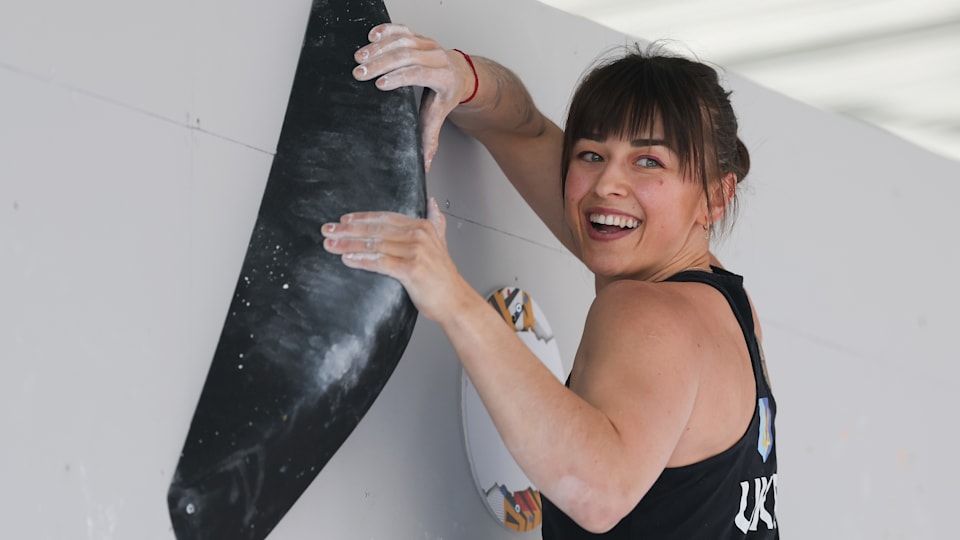Ievgeniia Kazbekova: "Climbing taught me to be brave, and to know that fear is OK"
In an exclusive interview with Olympics.com, Ukrainian sport climbing national champion and professional rock climber Kazbekova shares how she coped with living up to her impressive climbing lineage, and how climbing improved her mindset.

For Ievgeniia Kazbekova, learning to climb came as naturally as learning to walk.
This is because the Ukrainian, better known as "Jenya" had two national champion climbers for parents, and subsequently spent a lot of time at competitions as a toddler.
Instead of toys and dolls, she would play with quickdraws and carabiners, and the sport quickly became an obsession of hers too.
“I just do not remember myself not climbing, it's like a part of me,” Kazbekova told Olympics.com.
“I come from generations of climbers. Even before my parents were competing in World Cups and World Championships, my grandma was also a professional climber, after trying the sport as a student in university. She was a champion of speed climbing on natural rocks in Crimea. So it's like a dynasty that we were all born into.
“I just travelled everywhere with my parents as they weren't able to afford a babysitter. I would watch them compete and fulfil their dreams and do what they were passionate about, which had a huge impact on my view of life. I wanted to experience the same fulfilment.
“It’s funny, all the people that work at the (IFSC) international federation have known me since I was five years old when I was cheering for my parents!"
Ievgeniia Kazbekova of Ukraine competes in the Women's Sport Climbing Boulder & Lead Final on day four of 2024 Olympic Qualifier Series Shanghai on May 19, 2024 in Shanghai, China.
Growing up, Kazbekova’s parents also gave her the opportunity to practise gymnastics, dancing, and other sports. But her mind was already set.
“I was a very stubborn child and I remember giving my parents a really hard time if they wouldn't let me climb when they practised.
"After their training, they would tell me that they need to start making dinner and I would just have this huge breakdown and would scream and be like, ‘no, I'm not leaving until I get my climbing in!’”
Why Ievgeniia Kazbekova clashed with her parents
Kazbekova’s progress was quick, and it wasn’t long before she was competing in the international youth ranks.
This experience, coupled with expert mentorship from her parents, saw the Ukrainian crowned senior national champion at the age of just 16. But she took it all in her stride.
“It didn’t feel strange competing with adults at that age. It just felt like something that I'm supposed to be doing rather than a conscious choice,” she continued.
Teenagers typically clash with their parents at times, and the Dnipro native was no different. Despite her obvious talent and impressive resume, being coached by her mother and father was a roller-coaster journey.
“It's just very complicated and there are multiple layers,” she said with a smile.
“As a young adult, you do not know how to navigate your feelings, your emotions, or how to regulate yourself. When they would criticise me or tell me what I need to do better, I took it as a teenager being told by their parents that they're not good enough. So I really struggled throughout.
“It was great until I was 14, but after that I took a step back and asked them not to coach me for a while. I found my way back to them around 20, when we were already able to build our relationship as equal adults. It was then that I could really take all their lessons and all their experiences with me instead of trying to prove something to them as a teenager.”
Kazbekova’s reputation continued to grow over the subsequent years.
She regularly defended her bouldering and lead national titles and was a consistent competitor in World Cups and World Championships.
Her destiny seemed set. But at the age of 19, having dedicated her whole life to climbing, she started to question her identity and ambitions.
“I was like, I don't even know if those are my dreams. Like, what am I doing? Do I even love climbing or is this my parent’s dream?” she said.
“So I had to remove myself from my parents' influence, move away to another city and discover why I do the sport, and do I love the sport. Given that I am still competing again, you can see what answer I found: I do love it.
“Everything is always changing. Some people lose interest, and for some people it grows. So I check in every once in a while to see if I'm still happy with what I'm doing. If this is what I'm supposed to be doing, if I want to move on maybe or do something else. It's always kind of on the horizon and always in my eyesight.”
It was during this time that Kazbekova also realised that while it helps to have athletic DNA, hard work will always win through at the top level.
“One of the hardest lessons that I had to learn was that hard work beats talent, if talent doesn't work hard,” she admitted.
“I was very talented as a teenager, and I was very successful. But I learnt that the better you get, the harder the competition gets and I had to work so much harder as my performance and results were dropping.
“So around 20 years old, I changed my mindset. I realised that failing is actually super important and very valuable for growing, like in life in general.”
The mental benefits of sport climbing
Climbing is rare, in that many elite athletes also see their sport as their way of relaxing away from competition.
Typically, lead and boulder climbers spend a lot of time during their off season scrambling up rocks and boulders in the natural environment.
And it’s for this reason that Kazbekova’s parents still climb, and are still able to compete in veteran competitions.
“This makes me so happy because climbing is so much more than a sport, it’s a lifestyle. It is something that we love sharing with each other. It's something that we still love and still are passionate about. So I feel incredibly proud when I see them climb or I see them compete,” she said.
“It just makes me feel like climbing has no age limits. Like you can do it as long as you want, as long as you take care of your body.
“There are so many great qualities that climbing has taught me. To be brave, and to know that fear is OK. You can go ahead and do something even if you're afraid. Being resilient, and true to myself.
“A lot of who I am as a person is because of climbing and I hope to inspire others by expressing myself through the sport.” - Ievgeniia Kazbekova to Olympics.com
Why Paris 2024 is Kazbekova's 'biggest life goal'
Like so many others, Kazbekova missed out on the opportunity to compete in sport climbing’s debut (as a combined sport featuring boulder, lead and speed) on the Olympic Programme at Tokyo 2020 due to the pandemic.
However, climbing at Paris 2024 will be split between a speed competition and a combined boulder and lead competition.
As a lead and bouldering specialist, making the plane to compete at an Olympic Games means everything to Kazbekova.
“It is definitely one of the biggest life goals for me,” she said.
“It’s very new for our sport, an amazing privilege, and it's a lot about me exploring what I'm capable of. It's an opportunity to represent Ukraine on the world stage."

